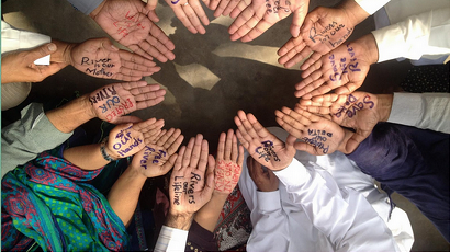Parallel to the climate conference in Paris, social movements and allies within the “Global Convergence of Land and Water Struggles” stand up for climate justice and real solutions to the climate crisis. This alliance of struggles has delivered its message to the COP21 currently meeting at Paris. Their statement follows.
The current food system is responsible for 44 to 57 percent of world’s greenhouse gas emissions, a big part of which come from large-scale corporate agriculture. These agribusiness emissions are particularly linked to deforestation, a result of the expansion of monocultures, agroindustrial production methods dependent of fossil fuels such as gasoline, fertilizers, pesticides, factory farming, transport and storage of goods, processing and food packaging, and a huge amount of food waste.
Small-scale food producers, including peasants, indigenous peoples, hunters and gatherers, family farmers, rural workers, forest dwellers, herders and pastoralists, fisherfolk and urban people are increasingly directly affected by the impacts of climate destruction and the resulting human rights violations. They urge for a radical transformation of food systems to models based on food sovereignty and agro-ecology, which are based on small-scale food producers and communities’ access to and control over land and other life-giving natural resources.
Social movements denounce the false solutions to the climate crisis which are discussed by governments and largely dictated by the corporate sector, such as climate-smart agriculture, carbon markets (REDD/REDD+), carbon capture and sequestration, fracking, hydropower, and the Blue Carbon initiative. Presented as “solutions” to the man-made climate crisis, these deepen the privatization and financialization of nature and lead to ever more resource grabs, dispossession of people, and human rights violations. This comes as no surprise, as the same actors that are largely responsible for eco-destruction in the first place—and serve the purpose of preserving the current economic and industrial food system—propose these false solutions.
The Convergence and its members underline that this is not about alternatives; it is about real solutions. These real solutions to the climate crisis will not come from the current industrial model, but are anchored in local community practices and are being developed and lived by communities every day the world over. A commonality of the diverse and locally adapted real solutions is that they build on the needs and rights of rural working people and their urban allies. They call for systemic changes and a fundamental shift away from proposals that are developed by and for a minority elite. One important part of the response to climate change is the transformation of our food systems based on agro-ecology and food sovereignty.
Food is a central issue of the climate discussion and it`s time to make a paradigm shift in our modes of production, distribution, and consumption to meet the man-made climate crisis. Peoples’ control over land, water, fisheries and seeds is a pre-condition for climate justice and the realization of human rights.
Join our event in Paris “Cooling the Planet: Frontline Communities lead the struggle.”
Follow latest updates via @Land_Water
Related articles:
Declaration of the Global Convergence of Land and Water Struggles (4 April 2015)
Global Convergence of Land and Water Struggles (26 March 2015)














